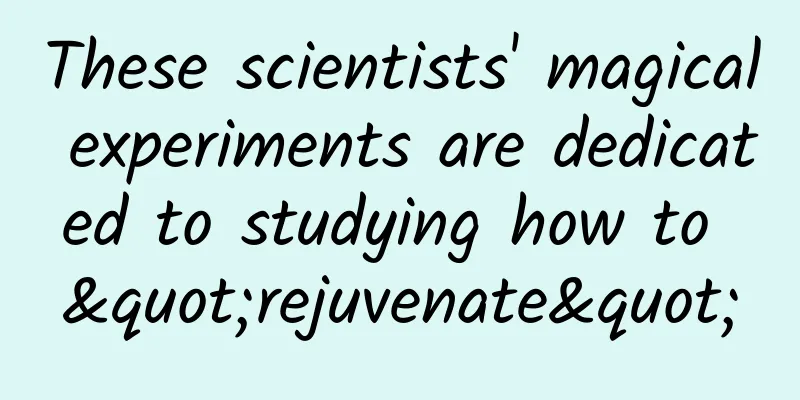These scientists' magical experiments are dedicated to studying how to "rejuvenate"

|
Staying young is basically one of the common pursuits of people all over the world. Recently, a "magical" experiment by foreign scientists has also been released. Nature published an article saying that a scholar from Stanford University extracted cerebrospinal fluid from young mice and injected it into the ventricles of old mice to test whether it could increase the brain function of old mice. Tadpole Jun understands that after reading the above sentence, most people will probably be like: How should I put it? It's a bit like the mad scientist in "Frankenstein"... Frankenstein is watching you… According to the scientist, in order to produce real and reliable data, cerebrospinal fluid was extracted from more than 300 mice, not including those in which the experiment failed. For this experiment, two groups of experimental mice were first selected, one group was 20 months old and the other was 10 weeks old. The 20-month-old mice were then continuously infused with fresh cerebrospinal fluid from 10-week-old mice. Secondly, the scientists compared these mice with another group of mice that were not infused with young cerebrospinal fluid. All the mice were given electric shocks accompanied by sound and light changes, and they were asked to connect the electric shocks with the sound and light changes. Finally, the experiment found that after a period of time, 40% of the mice that were infused with cerebrospinal fluid from young mice associated electric shocks with sound and light, while only 18% of ordinary mice did so. To some extent, the experiment can be considered a success. This experiment was done on mice and everyone felt it seemed acceptable, but if you think about it carefully, it is extremely terrifying. After all, humans have long been pursuing "rejuvenation". If the elderly can maintain brain function by transfusing cerebrospinal fluid from young people... Then the world might not be what it is now. In fact, whether it is "rejuvenation" or "immortality", it is very normal for humans to have this idea. Some seemingly crazy experiments are often just "experiments". If you want to turn science into reality, you still need to pass many levels. For ordinary people like us, if we want to maintain a healthy and young brain, we don’t have to take any crazy measures. There are more ethical "tricks" to choose from. Sanjay Gupta, a member of the National Academy of Medicine and deputy director of neurosurgery, proposed in his book "The Ageless Brain" that people can optimize our brains in many ways, and the decline in cognitive ability is not inevitable. Based on cutting-edge medical data and rich clinical cases, and using his lifelong obsession with and understanding of the brain, Sanjay Gupta proposes the insights and strategies needed to keep the mind sharp, and calls on the younger generation to take care of their brain health and prevent brain diseases as early as possible. Sanjay Gupta - Neurosurgeon, Vice Chairman of Neurosurgery at Grady Memorial Hospital, Assistant Professor at Emory University Hospital in Atlanta. He is the Chief Medical Correspondent of CNN who has won multiple Emmy Awards. He is called "the best doctor among reporters and the best reporter among doctors" by the media. He was once called a hero of CNN by Oprah Winfrey. He is also a member of the board of directors of the LIvestrong Foundation and a member of the American Academy of Neurology. He has received many medical and media awards: the Humanitarian Award from the National Press Photographers Association, the National Healthcare Communicator Gold Medal, the Achievement Award in Healthcare Communications from the American Medical Association Conference on Healthcare Communication, and the Mitch Leland Multiethnic Communications Humanitarian Award. In 2010, he was awarded the Healthcare Leadership Award by John F. Kennedy University. In 2011, he was named one of the "10 Most Influential People" by Forbes magazine. As an academic neurosurgeon and renowned war correspondent, he has spent decades exploring the deep connection between the heart and the brain. He once successfully performed a craniotomy on a dying Navy lieutenant without tools using an ordinary drill. At the same time, he used his journalistic identity to interview a large number of patients directly affected by dementia. In his book The Age-Defying Brain: It provides an overview of how the brain works, debunks theories about aging and cognitive decline, and then introduces readers to the latest research theories from the world's top scientists and new discoveries on how to better improve and protect brain function. It clearly denies 12 rumors about brain functions, such as that people will inevitably become forgetful when they get old and that dementia is an inevitable consequence of old age, and gives corresponding correct views. It emphasizes that brain decline can be prevented and intervened early, as well as optimized to continuously build a better and more resilient brain. Provides readers with a 12-week brain strengthening plan, using simple and scientific methods to repair your brain every day, including practical strategies to strengthen your brain every day. Your lifestyle habits can affect the fate of your brain more than your genes. END Tadpole Musical Notation original article, please indicate the source when reprinting Editor: YANG |
<<: No flowers to enjoy in May? Learn more about peonies
>>: Urgent reminder again! Don't take photos of these bugs
Recommend
China Automobile Dealers Association: Regional market analysis of new energy passenger vehicles in September 2022
According to the new energy vehicle retail data o...
What products are suitable for Baidu promotion? Is Baidu promotion easy to do?
Baidu covers 95% of Chinese Internet users. Inter...
Humans used light to "trick" AI, but the result was...
As we all know, artificial intelligence (AI) is v...
Case Analysis | How a startup app completes the launch and transformation of operations!
In the ever-changing market, how should APP compl...
When placing Tik Tok ads, should you choose FEED stream or DOU+? Pure dry goods!
In May, ByteDance launched the FEED direct live b...
16 industries, 29 cases, just read this article for information flow advertising!
The final effect of an advertisement is often det...
British Rail Operation Group: Introducing self-driving trains
A railway development report released by the Brit...
Honda and Alibaba team up to make it possible to pay parking fees in the car with Alipay in the future
According to foreign media reports, Honda announc...
It’s too sunny! Will my sun umbrella “break”? This “factor” is the key →
Sun umbrellas are indispensable in summer. Howeve...
User growth ≠ fission and new user acquisition!
Fission and attracting new users should not be th...
Digital RMB App is online: Mobile phone number registration is available and there are three major differences from Alipay and WeChat
Recently, the Digital RMB (pilot version) App was...
How to make a good chess and card game? Just being fun is not enough
The development of the Internet has also led to t...
The mediaization process of enterprises: a good opportunity for media transformation
Chen Tong's resignation caused quite a stir i...
Huawei's 5G phones are back, but supply may be limited
The Kirin 9000 chip used in the P50 Pro previousl...









